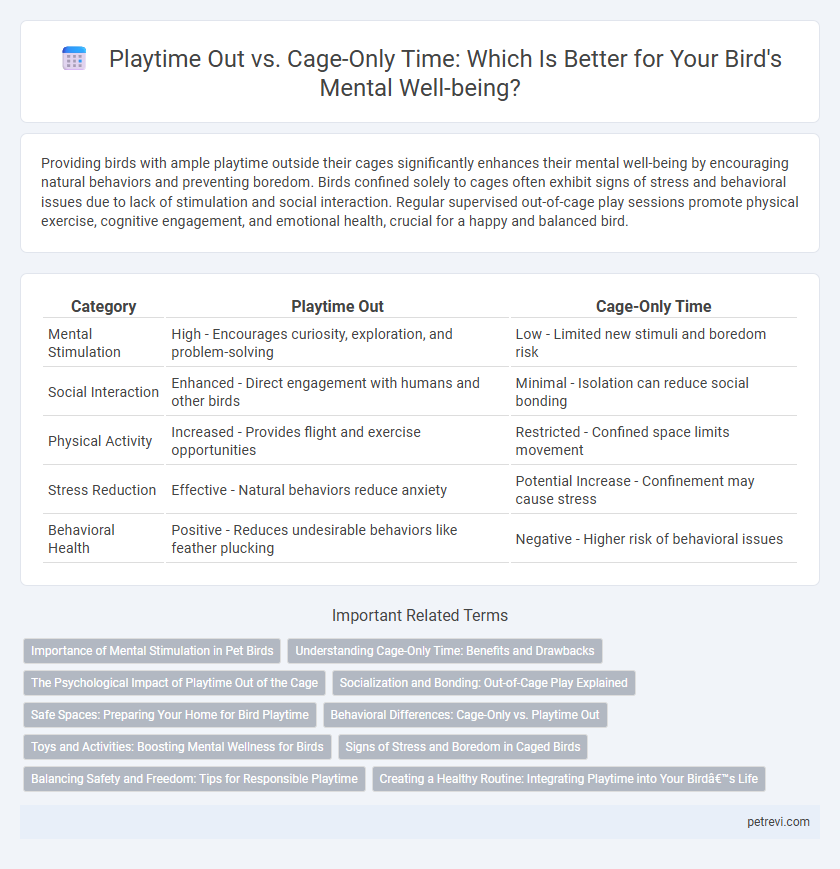Providing birds with ample playtime outside their cages significantly enhances their mental well-being by encouraging natural behaviors and preventing boredom. Birds confined solely to cages often exhibit signs of stress and behavioral issues due to lack of stimulation and social interaction. Regular supervised out-of-cage play sessions promote physical exercise, cognitive engagement, and emotional health, crucial for a happy and balanced bird.
Table of Comparison
| Category | Playtime Out | Cage-Only Time |
|---|---|---|
| Mental Stimulation | High - Encourages curiosity, exploration, and problem-solving | Low - Limited new stimuli and boredom risk |
| Social Interaction | Enhanced - Direct engagement with humans and other birds | Minimal - Isolation can reduce social bonding |
| Physical Activity | Increased - Provides flight and exercise opportunities | Restricted - Confined space limits movement |
| Stress Reduction | Effective - Natural behaviors reduce anxiety | Potential Increase - Confinement may cause stress |
| Behavioral Health | Positive - Reduces undesirable behaviors like feather plucking | Negative - Higher risk of behavioral issues |
Importance of Mental Stimulation in Pet Birds
Regular playtime outside the cage significantly enhances a bird's mental stimulation, reducing stress and preventing behavioral issues like feather plucking and aggression. Interactive toys, foraging activities, and social interaction during out-of-cage time support cognitive function and emotional health. Limiting birds to cage-only time can lead to boredom, anxiety, and a decline in overall well-being, highlighting the essential role of enrichment for pet bird mental health.
Understanding Cage-Only Time: Benefits and Drawbacks
Cage-only time provides birds with a secure and familiar environment that promotes rest and reduces stress by minimizing exposure to potential hazards. However, prolonged confinement can lead to boredom, behavioral issues, and reduced mental stimulation, negatively impacting overall well-being. Balancing cage time with interactive playtime is essential to maintain mental health, prevent feather plucking, and encourage natural behaviors.
The Psychological Impact of Playtime Out of the Cage
Playtime out of the cage significantly enhances a bird's psychological well-being by reducing stress and preventing behavioral issues such as feather plucking and aggression. Birds engage in natural behaviors like exploration, foraging, and social interaction during out-of-cage time, which stimulates cognitive function and promotes emotional health. Limited cage-only confinement can lead to boredom and depression, underscoring the importance of regular interactive playtime in enriching a bird's daily routine.
Socialization and Bonding: Out-of-Cage Play Explained
Out-of-cage play is essential for bird mental well-being, providing vital socialization and bonding opportunities that cage-only time lacks. Interactive play outside the cage allows birds to engage with their environment, reducing stress and preventing behavioral issues such as feather plucking or excessive vocalization. Regular out-of-cage sessions strengthen the human-bird bond, promoting trust and emotional health essential for species like parrots and cockatiels.
Safe Spaces: Preparing Your Home for Bird Playtime
Creating safe spaces for bird playtime involves removing toxic plants, securing electrical cords, and ensuring windows and doors are closed to prevent escapes. Providing a variety of bird-safe toys and perches within a designated play area encourages mental stimulation and physical exercise. Balancing out-of-cage playtime with supervised freedom enhances bird mental well-being and reduces stress associated with cage confinement.
Behavioral Differences: Cage-Only vs. Playtime Out
Birds kept cage-only often display signs of stress such as feather plucking, repetitive pacing, and vocalization intensity, indicating frustration and boredom. Playtime out encourages natural behaviors like exploration, foraging, and social interaction, reducing anxiety and promoting cognitive stimulation. Consistent out-of-cage activity improves overall mental well-being, leading to more balanced and calmer behavior patterns.
Toys and Activities: Boosting Mental Wellness for Birds
Providing birds with diverse toys and interactive activities during playtime outside the cage significantly enhances their cognitive stimulation and emotional well-being. Rotating puzzle feeders, foraging toys, and mimicry training challenges encourages problem-solving and prevents boredom-related behaviors in captive birds. Enriching the environment beyond cage-only time supports natural instincts and promotes mental health, reducing stress and fostering a happier, more active companion.
Signs of Stress and Boredom in Caged Birds
Caged birds often exhibit signs of stress and boredom such as feather plucking, repetitive pacing, and excessive vocalization, indicating poor mental well-being. Regular playtime outside the cage provides essential stimulation through interaction, foraging activities, and environmental enrichment, reducing the risk of behavioral issues. Monitoring bird behavior for signs like lethargy or aggression helps owners adjust playtime and cage environment to support optimal mental health.
Balancing Safety and Freedom: Tips for Responsible Playtime
Providing birds with daily playtime outside their cage enhances mental stimulation and reduces stress, vital for preventing behavioral issues such as feather plucking and aggression. Balancing safety and freedom involves supervised out-of-cage sessions in bird-proofed areas free from hazards like open windows, toxic plants, and ceiling fans. Offering a variety of toys and interactive activities during playtime supports cognitive development while maintaining a secure environment that respects the bird's natural instincts.
Creating a Healthy Routine: Integrating Playtime into Your Bird’s Life
Integrating regular playtime outside the cage significantly boosts a bird's mental well-being by providing essential physical exercise and mental stimulation that cage-only time lacks. Establishing a consistent routine with interactive toys, foraging activities, and supervised exploration aids in preventing boredom and destructive behaviors. Prioritizing a balanced schedule of both out-of-cage play and restful cage time fosters a healthy, happy bird with reduced stress and enhanced cognitive development.
Playtime Out vs Cage-Only Time for Bird Mental Well-being Infographic

 petrevi.com
petrevi.com